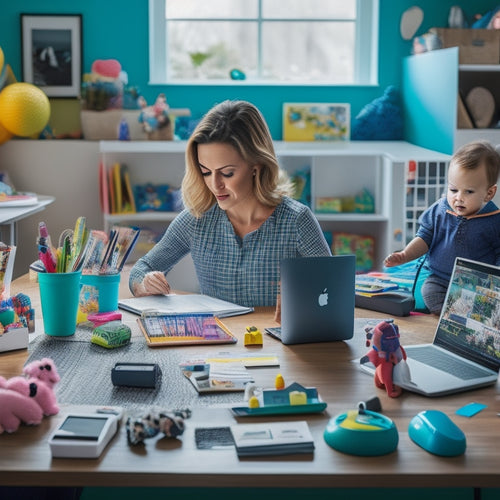
Breaking News:** Men's School Challenges Traditional Caregiving Norms
Share
A groundbreaking school in Bogotá, Colombia is challenging traditional caregiving norms by teaching men essential caregiving skills. This initiative aims to bridge the gap in unpaid caregiving work, which is primarily carried out by women. By promoting cultural shifts in men's family roles, the program encourages men to become equal partners in caregiving, leading to balanced responsibilities. As men take on more caregiving roles, they're breaking free from traditional gender norms, fostering stronger family bonds, and driving a cultural shift in caregiving. As this movement gains momentum, it's redefining what it means to be a caregiver, and its impact is just beginning to unfold.
Key Takeaways
• Care School for Men in Bogotá, Colombia, is a program that teaches men basic caregiving skills, promoting a cultural shift in men's family roles.
• The program challenges traditional gender inequality, where nearly three-quarters of unpaid caregiving work globally is done by women, by making men equal partners in caregiving.
• By taking on caregiving roles, men are breaking free from traditional gender norms, leading to stronger family bonds, teamwork, and mutual respect.
• The initiative inspires similar programs globally, reshaping societal approaches to caregiving and impacting gender equality and family dynamics.
• As men become more confident caregivers, they experience personal growth, increased confidence, and a deeper understanding of themselves and their roles in families.
Rethinking Traditional Caregiving Roles
Nearly three-quarters of unpaid caregiving work globally is shouldered by women, perpetuating a long-standing gender inequality that the Care School for Men in Bogotá, Colombia, aims to challenge.
The program seeks to redefine traditional caregiving roles, encouraging men to take on more responsibilities and challenge gender stereotypes. By teaching men basic caregiving skills, the school promotes cultural shifts in the way men perceive their roles in the family.
It's not just about diaper changing and hair styling; it's about men becoming equal partners in caregiving. By doing so, the program hopes to create a more balanced distribution of responsibilities, allowing women to share the load and men to develop a deeper connection with their families.
Global Impact of Men's Caregiving
As men's caregiving programs gain traction globally, a profound shift is emerging in the way societies approach caregiving responsibilities, with far-reaching implications for gender equality and family dynamics.
This cultural shift is driving a significant societal impact, as men are increasingly taking on caregiving roles and challenging traditional norms. The ripple effect is being felt worldwide, with programs like the Care School for Men in Bogotá, Colombia, inspiring similar initiatives globally.
As men become more confident caregivers, they're redefining their roles in families and sparking a new era of equality. This paradigm shift has the potential to transform the way we approach caregiving, fostering a more balanced and harmonious distribution of responsibilities within families and communities.
Empowering Men, Strengthening Families
By taking on caregiving roles, men are breaking free from traditional gender norms, ultimately strengthening family bonds and fostering a sense of unity and cooperation. This shift in responsibility is redefining masculinity, allowing men to embrace their caring side and become more involved in their families' lives.
As men take on more caregiving tasks, they're not only empowering themselves but also their families. Family empowerment is key to creating a more balanced and harmonious home environment. By sharing caregiving responsibilities, men and women can work together as equal partners, promoting a sense of teamwork and mutual respect.
As men become more confident in their caregiving abilities, they're better equipped to support their families, leading to stronger, more resilient relationships.
Personal Growth and Confidence
Through the Care School for Men's engaging exercises and conversations, participants like Luis Rodríguez experience a profound shift in their personal growth and confidence, emerging as more capable and empowered caregivers. This transformation is evident in the way they approach caregiving tasks, taking on new responsibilities with ease and assurance.
| Before | After |
|---|---|
| Uncertain in caregiving abilities | Confident in caregiving skills |
| Limited involvement in household tasks | Active participation in household responsibilities |
| Struggling to build relationships | Building strong relationships through self-discovery |
As men navigate this journey of self-discovery, they develop a deeper understanding of themselves and their roles in their families. By building relationships and fostering a sense of community, the Care School for Men provides a supportive environment for men to grow and thrive as caregivers.
Changing Household Dynamics Forever
Men who've attended the Care School for Men are redefining their roles at home, taking on more active responsibilities and sparking a shift in household dynamics that benefits the entire family. This gender role evolution is driving a cultural shift, where caregiving is no longer seen as solely a woman's domain.
As men take on more responsibilities, family dynamics are undergoing a revolution, with caregiving equality becoming a new norm. This shift isn't only empowering men but also strengthening family bonds and promoting a more balanced distribution of household tasks.
Scaling Up for Societal Change
As the Care School for Men expands its reach, its founders are now turning their attention to scaling up the program to drive widespread societal change. They recognize that achieving societal transformation requires community engagement and cultural shifts. To achieve this, they plan to increase educational outreach, partnering with local organizations and businesses to promote the program.
Advocating for Gender Equality
By championing policy reforms and cultural shifts, the Care School for Men and its supporters are driving a broader movement to dismantle gender stereotypes and promote equal caregiving responsibilities.
Through advocacy campaigns, they're pushing for a society where men and women share caregiving roles without bias. By challenging traditional norms, the program aims to create a culture where men feel empowered to take on caregiving tasks without fear of judgment. This, in turn, will lead to more equal partnerships at home and a redefinition of masculinity.
Frequently Asked Questions
How Do Men's Caregiving Programs Impact Children's Mental Health?
Men's caregiving programs positively impact children's mental health by fostering emotional intelligence and strengthening social bonds, as involved fathers promote a sense of security, empathy, and understanding, leading to healthier childhood development.
Are There Similar Programs for Women to Learn Traditional Masculine Skills?
She explores similar programs for women, discovering empowerment initiatives like Female Trades, which offer training in traditionally masculine skills, promoting gender equality and challenging societal norms, ultimately fostering a sense of belonging.
Can the Care School for Men Be Replicated in Other Countries?
The Care School for Men's model can be replicated in other countries through cultural adaptation, leveraging government funding, and partnerships, enabling a broader reach and fostering a global shift towards equal caregiving responsibilities.
What Is the Average Age of Men Attending the Care School for Men?
As men navigate life's journey, often hitting a midlife crisis, the Care School for Men welcomes them with open arms, defying ageism debates, with the average attendee being around 35-40 years old, seeking growth and a chance to redefine traditional norms.
How Does the Program Address Men Who Resist Changing Their Caregiving Roles?
The program tackles men's resistance to changing caregiving roles by addressing masculine pride, using resistance strategies like open conversations and reflective exercises to help men overcome ego barriers and embrace equal caregiving responsibilities.
Related Posts
-

Innovative Hidden Storage for Modern Bathrooms
You're investing in a modern bathroom that's a serene oasis, and ample hidden storage is essential to maintaining tha...
-

Momtrepreneurs: Master Organization for Success
As a busy momtrepreneur, I've learned that mastering organization is the key to unleashing my full potential. To achi...
-

Planner Preferences Spark Paper Vs. Digital Debate
The debate between paper and digital planners has ignited a passionate discussion among planner enthusiasts, with eac...


